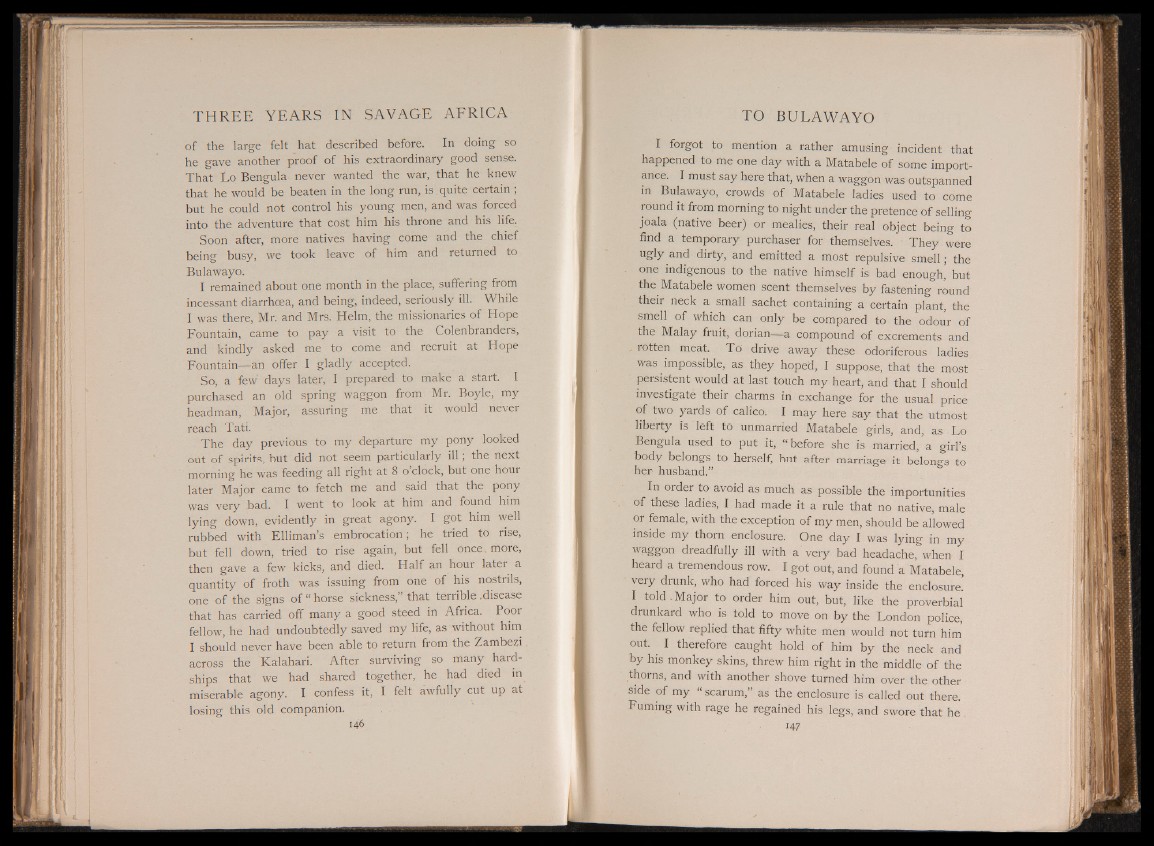
of the large felt hat described before. In doing so
he gave another proof of his extraordinary good sense.
That Lo Bengula never wanted the war, that he knew
that he would be beaten in the long run, is . quite certain ;
but he could not control his young men, and was forced
into the adventure that cost him his throne and his life.
Soon after, more natives having come and the chief
being busy, we took leave of him and returned to
Bulawayo.
I remained about one month in the place, suffering from
incessant diarrhoea, and being, indeed, seriously ill. While
I was there, Mr. and Mrs. Helm, the missionaries of Hope
Fountain, came to pay a visit to the Colenbranders,
and kindly asked me to come and recruit at Hope
Fountain—an offer I gladly accepted.
So, a few days late.r, I prepared to make a start. I
purchased an old spring waggon from Mr. Boyle, my
headman, Major, assuring me that it would never
reach Tati.
The day previous to my departure my pony looked
out of spirits, but did not seem particularly ill; the next
morning he was feeding all right at 8 o clock, but one hour
later Major came to fetch me and said that the pony
was very .bad. I went to look at him and found him
lying down, evidently in great agony. I got him well
rubbed with Elliman’s embrocation; he tried to rise,
but fell down, tried to rise again, but fell once, more,
then gave a few kicks, and died. Half an hour later a
quantity of froth was issuing from one of his nostrils,
one of the signs of “ horse sickness,” that terrible -disease
that has carried off many a good steed in Africa. Poor
fellow, he had undoubtedly saved my life, as without him
I should never have been able to return from the Zambezi
across the Kalahari. After surviving so many hardships
that we had shared together, he had died in
miserable agony. I confess it, I felt awfully cut up at
losing this old companion.
I forgot to mention a rather amusing incident that
happened to me one day with a Matabele of some importance.
I must say here that, when a waggon was outspanned
in Bulawayo, crowds of Matabele ladies used to come
round it from morning to night under the pretence of selling
joala (native beer) or mealies, their real object being to
find a temporary purchaser for themselves. They were
ugly and dirty, and emitted a most repulsive smell; the
one indigenous to the native himself is bad enough, but
the Matabele women scent themselves by fastening round
their neck a small sachet containing a certain plant, the
smell of which can only be compared to the odour of
the Malay fruit, dorian—a compound of excrements and
, rotten meat. To drive away these odoriferous ladies
was impossible, as they hoped, I suppose, that the most
persistent would at last touch my heart, and that I should
investigate their charms in exchange for the usual price
of two yards of calico. I may here say that the utmost
liberty is left to unmarried Matabele girls, and, as Lo
Bengula used to put it, “ before she is married, a girl’s
body belongs to herself, but after marriage it belongs to
her husband.”
In order to avoid as much as possible the importunities
of these ladies, I had made it a rule that no native, male
or female, with the exception of my men, should be allowed
inside my thorn enclosure. One day I was lying in my
waggon dreadfully ill with a very bad headache, when I
heard a tremendous row. I got out, and found a Matabele,
very drunk, who had forced his way inside the enclosure!
I told.Major to order him out, but, like the proverbial
drunkard who is told to move on by the London police,
the fellow replied that fifty white men would not turn him
out. I therefore caught hold of him by the neck and
by his monkey skins, threw him right in the middle of the
thorns, and with another shove turned him over the other
side of my “ scarum,” as the enclosure is called out there.
Fuming with rage he regained his legs, and swore that he
i47